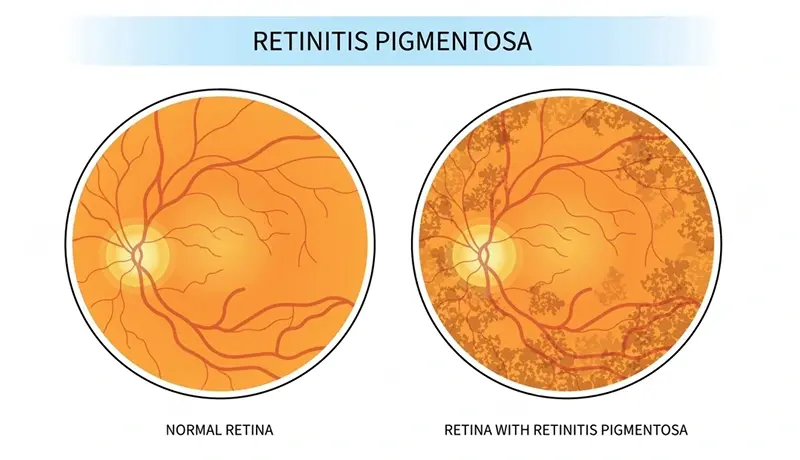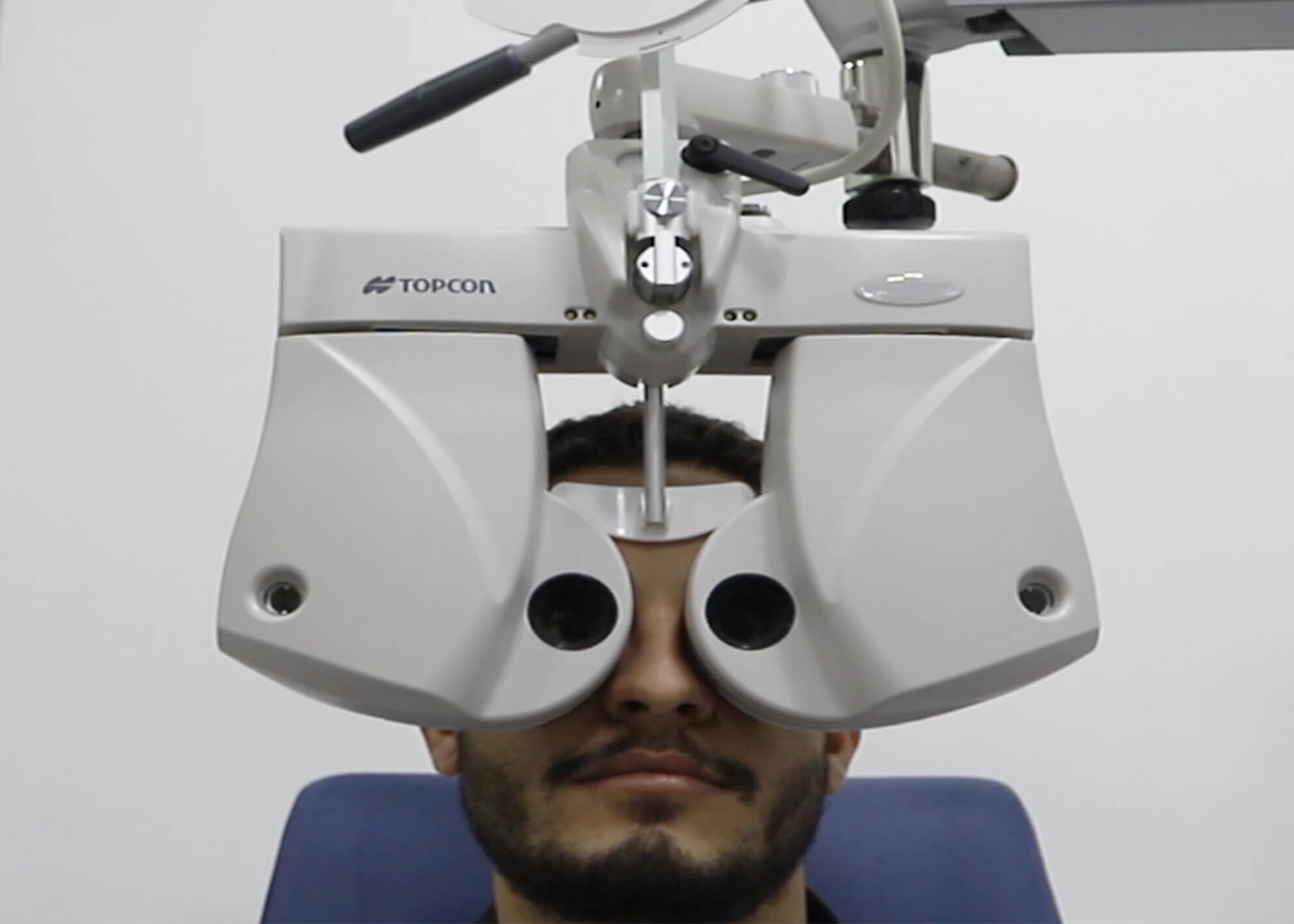Retinitis Pigmentosa at Eye Clinic DRHC Dubai
Understanding Retinitis Pigmentosa (RP):
Retinitis Pigmentosa (RP) is a hereditary disorder that causes the gradual degeneration of the retina, leading to progressive vision loss. The retina contains photoreceptor cells known as rods and cones, which are essential for converting light into visual signals that are sent to the brain. RP primarily affects the rods, which are responsible for vision in low light conditions and peripheral vision, but can also impact cones, leading to challenges with color perception and central vision.
RP is a complex condition with over 100 different genetic mutations associated with it. These mutations affect how the photoreceptor cells function and survive, eventually causing them to die off. The rate of progression and the age at which symptoms begin can vary significantly, even within the same family. Some individuals may start noticing symptoms in childhood, while others may not experience significant vision loss until adulthood.
Symptoms of Retinitis Pigmentosa:
The symptoms of Retinitis Pigmentosa often begin with difficulty seeing at night (night blindness) and a loss of peripheral (side) vision. As the disease progresses, patients may experience tunnel vision, where the visual field narrows, making it difficult to see objects on the sides. In the later stages, central vision can also be affected, potentially leading to significant visual impairment or blindness.
Causes and Risk Factors:
RP is primarily caused by genetic mutations. These mutations affect the function of the photoreceptor cells (rods and cones) in the retina. The condition is typically inherited in an autosomal recessive, autosomal dominant, or X-linked pattern. Individuals with a family history of RP are at a higher risk of developing the condition.
Stages of Retinitis Pigmentosa:
The progression of RP typically follows a predictable pattern:
- Early Stage: The earliest sign is often night blindness, where individuals struggle to see in dim lighting. At this stage, peripheral vision may still be intact.
- Mid Stage: As the disease progresses, patients begin to lose peripheral vision, creating a narrowing of the visual field, commonly referred to as "tunnel vision." During this stage, activities such as driving or navigating in unfamiliar places may become increasingly difficult.
- Advanced Stage: In the advanced stages, central vision can also be compromised, leading to difficulty in reading, recognizing faces, and performing tasks that require detailed vision. Total blindness is rare, but severe visual impairment is common.
Treatment of Retinitis Pigmentosa with IV Injections
Retinitis Pigmentosa (RP) is a genetic eye disorder that leads to progressive vision loss due to the degeneration of the retina's photoreceptor cells. Although there is no cure for RP, certain treatments aim to slow the progression and manage symptoms.
One such treatment option is the use of intravitreal (IV) injections. These injections deliver medications directly into the vitreous gel of the eye, targeting the affected retinal tissue. In recent years, clinical trials have explored the use of gene therapy and growth factors administered via IV injections to help protect photoreceptor cells from further degeneration and promote retinal health.
Additionally, anti-VEGF (vascular endothelial growth factor) injections, commonly used for other retinal diseases, are being studied for their potential benefits in treating complications related to RP, such as retinal swelling.
While IV injections are not a cure, they represent a promising avenue for slowing the progression of Retinitis Pigmentosa and preserving vision for a longer period.
Management of Retinitis Pigmentosa:
While there is no cure for RP, effective management can help slow the progression of the disease and improve the quality of life. At DRHC Dubai, we offer a comprehensive approach to managing RP, tailored to each patient’s unique needs.
- Regular Monitoring and Early Intervention:
- Early diagnosis is crucial in managing RP. Regular eye exams allow our specialists to monitor the progression of the disease and adjust treatment plans as necessary.
- Genetic Counseling: Understanding the genetic basis of RP in each patient enables personalized treatment strategies. Our genetic counselors work with families to provide insights into inheritance patterns and the likelihood of passing the condition to future generations.
- Vision Preservation Strategies:
- Nutritional Support: Research has shown that certain nutritional supplements, such as Vitamin A, lutein, and omega-3 fatty acids, can slow the degeneration of photoreceptor cells. Our team will work with you to develop a dietary plan that supports retinal health.
- Light Management: Protecting the eyes from excessive light exposure is essential. Wearing UV-protective sunglasses and managing light exposure can help reduce stress on the retina.
- Innovative Treatments:
- Gene Therapy: DRHC Dubai is at the forefront of offering cutting-edge gene therapy for patients with specific genetic mutations. This treatment involves introducing a healthy copy of the gene into retinal cells, potentially halting or reversing the progression of RP.
- Retinal Implants and Prosthetics: For those with advanced RP, retinal implants such as the Argus II can restore a degree of vision by bypassing damaged photoreceptors and directly stimulating the retinal neurons. These “bionic eyes” offer a revolutionary option for those who have lost most of their vision.
- Stem Cell Therapy: Emerging research in stem cell therapy holds promise for regenerating damaged retinal cells. Although still experimental, this therapy may offer future hope for RP patients.
- Low Vision Rehabilitation:
- Assistive Technologies: Our low vision specialists provide access to the latest in assistive devices, such as magnifying lenses, screen readers, and adaptive software, to enhance remaining vision and maintain independence.
- Occupational Therapy: Training in using peripheral vision effectively and adapting to daily tasks can significantly improve the quality of life. Our occupational therapists work with patients to develop these skills.
- Emotional and Psychological Support:
- Adjusting to vision loss can be emotionally challenging. At DRHC Dubai, we offer comprehensive support, including counseling services and support groups, to help patients and their families cope with the emotional aspects of RP.
Comprehensive Care AT DRHC Dubai?
At DRHC Dubai, we understand that Retinitis Pigmentosa is not just a visual condition but a life-altering journey. Our multidisciplinary team is committed to providing compassionate, expert care that addresses every aspect of RP, from diagnosis to management and emotional support. We leverage the latest advancements in ophthalmology and genetics to offer hope and improved quality of life to our patients.
.png?width=281&height=59&name=bookanappointment%20(1).png)
At Dr. Rami Hamed Center, our Ophthalmology department is dedicated to safeguarding your vision health through expert eye care Professionals, Renowned as one of the best eye care clinics in Dubai our Ophthalmology Specialists provide services for Cataract and Retina treatment with Laser and Refractive surgeries.




.png?width=281&height=59&name=bookanappointment%20(1).png)






